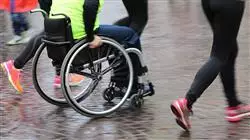University certificate
Scientific endorser

The world's largest faculty of sports science”
Introduction to the Program
The Postgraduate diploma allows training in simulated environments, which provide immersive learning programmed to train for real situations”

The physiology of muscle, as well as the biochemistry that regulates the entire metabolic process resulting from physical activity, is the basis of any Sports Nutritionist. This intensive training explains the relationship of the muscle with the rest of the systems involved in physical activity, as well as the relevance of the different macronutrients in the physiological performance of the muscular system.
This program will approach biochemistry and exercise metabolism from a scientific and practical point of view, partially renouncing the complexity of the subject. Likewise, the student will learn how to monitor the athlete and para-athlete throughout the season, in which it is considered vital to know the basal values to know what their starting point is, and thus plan the different phases of the season to enhance their performance.
Within this program we can find a teaching staff of the highest level, made up of professionals closely related to Sports Nutrition, outstanding in their field and who lead lines of research and field work, as well as recognized specialists from leading societies and prestigious universities. The teachers of this Postgraduate diploma are professionals who seek excellence in their teaching and work, teaching in university centers and working with athletes to maximize their performance.
Learn the most suitable diets for each type of athlete and you will be able to give more personalized advice”
This Postgraduate diploma in Muscular and Metabolic Physiology. Athlete and Parathlete Assessment contains the most complete and up-to-date scientific program on the market. The most important features include:
- The graphic, schematic, and eminently practical contents with which they are created contain information that is indispensable for professional practice
- It contains exercises where the self-assessment process can be carried out to improve learning
- Algorithm-based interactive learning system for decision-making for patients with feeding problems
- Theoretical lessons, questions to the expert, debate forums on controversial topics, and individual reflection assignments
- Content that is accessible from any fixed or portable device with an Internet connection
This Postgraduate diploma may be the best investment you can make in the selection of a refresher program for two reasons: in addition to updating your knowledge in Muscular and Metabolic Physiology. Athlete and Parathlete Assessment, you will obtain a Postgraduate diploma qualification from TECH""
Its teaching staff includes professionals belonging to the field of nutrition, who contribute their work experience to this training, as well as renowned specialists from reference societies and prestigious universities.
The multimedia content, developed with the latest educational technology, will provide the professional with situated and contextual learning, i.e., a simulated environment that will provide immersive training programmed to train in real situations.
This program is designed around Problem Based Learning, whereby the professional must try to solve the different professional practice situations that arise during the academic year.The professional will be assisted by an innovative interactive video system created by renowned and experienced experts in sports nutrition.
Food and sport must go hand in hand, as it is essential that athletes follow a proper diet to help them improve their performance"

Immerse yourself in this comprehensive Postgraduate diploma and improve your skills in nutritional counseling for athletes"
Why study at TECH?
TECH is the world’s largest online university. With an impressive catalog of more than 14,000 university programs available in 11 languages, it is positioned as a leader in employability, with a 99% job placement rate. In addition, it relies on an enormous faculty of more than 6,000 professors of the highest international renown.

Study at the world's largest online university and guarantee your professional success. The future starts at TECH”
The world’s best online university according to FORBES
The prestigious Forbes magazine, specialized in business and finance, has highlighted TECH as “the world's best online university” This is what they have recently stated in an article in their digital edition in which they echo the success story of this institution, “thanks to the academic offer it provides, the selection of its teaching staff, and an innovative learning method aimed at educating the professionals of the future”
A revolutionary study method, a cutting-edge faculty and a practical focus: the key to TECH's success.
The most complete study plans on the university scene
TECH offers the most complete study plans on the university scene, with syllabuses that cover fundamental concepts and, at the same time, the main scientific advances in their specific scientific areas. In addition, these programs are continuously being updated to guarantee students the academic vanguard and the most in-demand professional skills. In this way, the university's qualifications provide its graduates with a significant advantage to propel their careers to success.
TECH offers the most comprehensive and intensive study plans on the current university scene.
A world-class teaching staff
TECH's teaching staff is made up of more than 6,000 professors with the highest international recognition. Professors, researchers and top executives of multinational companies, including Isaiah Covington, performance coach of the Boston Celtics; Magda Romanska, principal investigator at Harvard MetaLAB; Ignacio Wistumba, chairman of the department of translational molecular pathology at MD Anderson Cancer Center; and D.W. Pine, creative director of TIME magazine, among others.
Internationally renowned experts, specialized in different branches of Health, Technology, Communication and Business, form part of the TECH faculty.
A unique learning method
TECH is the first university to use Relearning in all its programs. It is the best online learning methodology, accredited with international teaching quality certifications, provided by prestigious educational agencies. In addition, this disruptive educational model is complemented with the “Case Method”, thereby setting up a unique online teaching strategy. Innovative teaching resources are also implemented, including detailed videos, infographics and interactive summaries.
TECH combines Relearning and the Case Method in all its university programs to guarantee excellent theoretical and practical learning, studying whenever and wherever you want.
The world's largest online university
TECH is the world’s largest online university. We are the largest educational institution, with the best and widest online educational catalog, one hundred percent online and covering the vast majority of areas of knowledge. We offer a large selection of our own degrees and accredited online undergraduate and postgraduate degrees. In total, more than 14,000 university degrees, in eleven different languages, make us the largest educational largest in the world.
TECH has the world's most extensive catalog of academic and official programs, available in more than 11 languages.
Google Premier Partner
The American technology giant has awarded TECH the Google Google Premier Partner badge. This award, which is only available to 3% of the world's companies, highlights the efficient, flexible and tailored experience that this university provides to students. The recognition as a Google Premier Partner not only accredits the maximum rigor, performance and investment in TECH's digital infrastructures, but also places this university as one of the world's leading technology companies.
Google has positioned TECH in the top 3% of the world's most important technology companies by awarding it its Google Premier Partner badge.
The official online university of the NBA
TECH is the official online university of the NBA. Thanks to our agreement with the biggest league in basketball, we offer our students exclusive university programs, as well as a wide variety of educational resources focused on the business of the league and other areas of the sports industry. Each program is made up of a uniquely designed syllabus and features exceptional guest hosts: professionals with a distinguished sports background who will offer their expertise on the most relevant topics.
TECH has been selected by the NBA, the world's top basketball league, as its official online university.
The top-rated university by its students
Students have positioned TECH as the world's top-rated university on the main review websites, with a highest rating of 4.9 out of 5, obtained from more than 1,000 reviews. These results consolidate TECH as the benchmark university institution at an international level, reflecting the excellence and positive impact of its educational model.” reflecting the excellence and positive impact of its educational model.”
TECH is the world’s top-rated university by its students.
Leaders in employability
TECH has managed to become the leading university in employability. 99% of its students obtain jobs in the academic field they have studied, within one year of completing any of the university's programs. A similar number achieve immediate career enhancement. All this thanks to a study methodology that bases its effectiveness on the acquisition of practical skills, which are absolutely necessary for professional development.
99% of TECH graduates find a job within a year of completing their studies.
Postgraduate Diploma in Muscular and Metabolic Physiology. Assessment of the Athlete and Paradeportista
To ensure the proper biochemical functioning of the metabolism, through sports practice, the professional in charge of this type of assessment must have a set of skills in the area of kinesiology and nutrition. At TECH Global University, one of our main objectives is to orient the academic training processes towards expertise in the labor field and, therefore, we have created this program. Thanks to its curriculum it will be possible to delve, at first, in the aspects of biological composition of the muscular and skeletal structure to, consequently, address the body composition of athletes and their respective physiological-metabolic limitations. Likewise, contents referring to food planning and essential tools for assessment (biochemical and anthropometric) at different times of the season are presented. As for the thematic axes of updating, the most recent studies on the management of ergogenic aids in paradeportistas, aimed at increasing physical capacity, and, on the other hand, scientific evidence regarding the intake of drugs and their proper use are exposed.
Postgraduate Diploma in Muscular and Metabolic Physiology. Assessment of the Athlete and Paradeportista
This postgraduate course of TECH will enrich the daily professional practice of nutritionists and sports specialists, since it offers a complete theoretical and practical tour that explores the implications of physical activity in the movement and strengthening of muscle tissue. The future expert in this subject will have the necessary skills to detect nutritional deficits and states of overtraining, through the interpretation of biochemical information. This will allow him/her to adapt his/her training plans to the physical condition of the athlete or para-athlete, thus ensuring the organic improvement of his/her performance. Simultaneously, then, you will be able to sharpen your skills in the monitoring of physical condition and in the constant updating of requirements, both nutritional and training, essential tasks to avoid deficiencies and prevent injuries.







